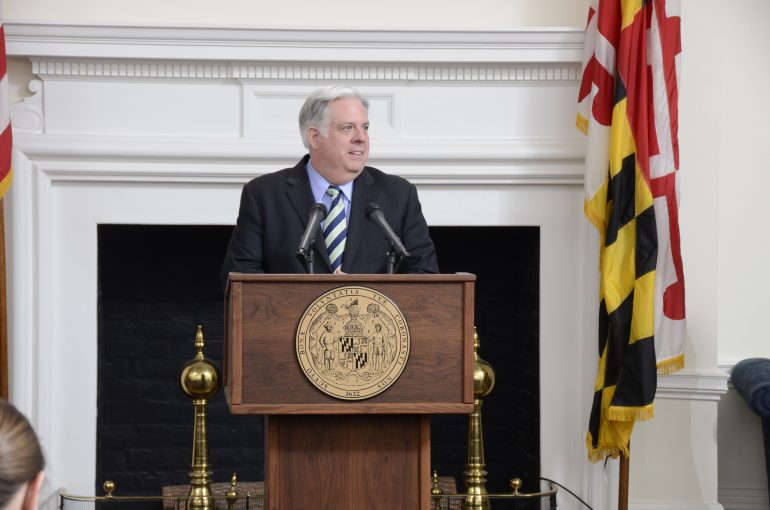Gov. Larry Hogan on Tuesday announced legislation to repeal the stormwater management fee, critically known as the “rain tax,” encouraging localities to address their runoff requirements as they choose without a state-mandated fee.
In 2013, legislation established the fee in 10 jurisdictions to fund management of urban runoff and keep pollutants from entering the Chesapeake Bay every time it rains.
The mandate was implemented to address the Environmental Protection Agency’s “pollution diet,” a federal mandate that requires programs to be in place by 2025 that would decrease the amount of stormwater pollution entering the Chesapeake Bay.
Hogan’s proposed legislation, sponsored in the Senate by James Brochin, D-Baltimore County, “will repeal the mandate that a county or municipality must establish a stormwater remediation fee,” Hogan said.

This legislation would enable counties to decide for themselves how to meet the federal mandate’s requirements, he said, whether through a fee or out of their own county budget.
The annual fee is currently mandated in nine counties — Anne Arundel, Baltimore, Carroll, Charles, Frederick, Harford, Howard, Montgomery and Prince George’s — as well as Baltimore City, taxing residential, federal, commercial and industrial properties, non-profit and religious organizations, private schools, private colleges and universities, parking lots and vacant properties.
Each jurisdiction’s local officials determine the dollar amount that constituents pay, whether through a flat rate, a graduated rate determined by the amount of impervious surface or another method.
But Senate President Thomas V. “Mike” Miller Jr., D-Calvert, Charles, and Prince George’s, said in a news conference earlier Tuesday that the fee, originally requested by the jurisdictions, allowed discretion in how they were to pay it.
“It’s not going to be eliminated — people are going to have to pay for it, whether through a general fund or a remediation fee,” Miller said. “By 2017 they’re going to have to account for the remediations they’ve done with regard to cleaning up the Chesapeake Bay.”
The revenues from the fee go into local watershed protection and restoration funds, which pay for stormwater management, stream and wetland restoration, public education and outreach, and operation and maintenance of existing stormwater management programs.
Eliminating the fee could spark inaction of the counties, neglecting to address stormwater pollution, said Tom Zolper, Maryland communication coordinator for the Chesapeake Bay Foundation.
“The governor has said what he doesn’t support, but what he hasn’t provided is a solution. These 10 jurisdictions need money to help reduce a problem we call urban runoff. In many of these areas that is one of the biggest sources of pollution,” Zolper said.
”If we repeal the law entirely, you’re taking a law that had become a little toothless and you’re making it gumless — we would have no way to provide some dedicated funding to these local counties to fund this work,” Zolper said.


You must be logged in to post a comment.